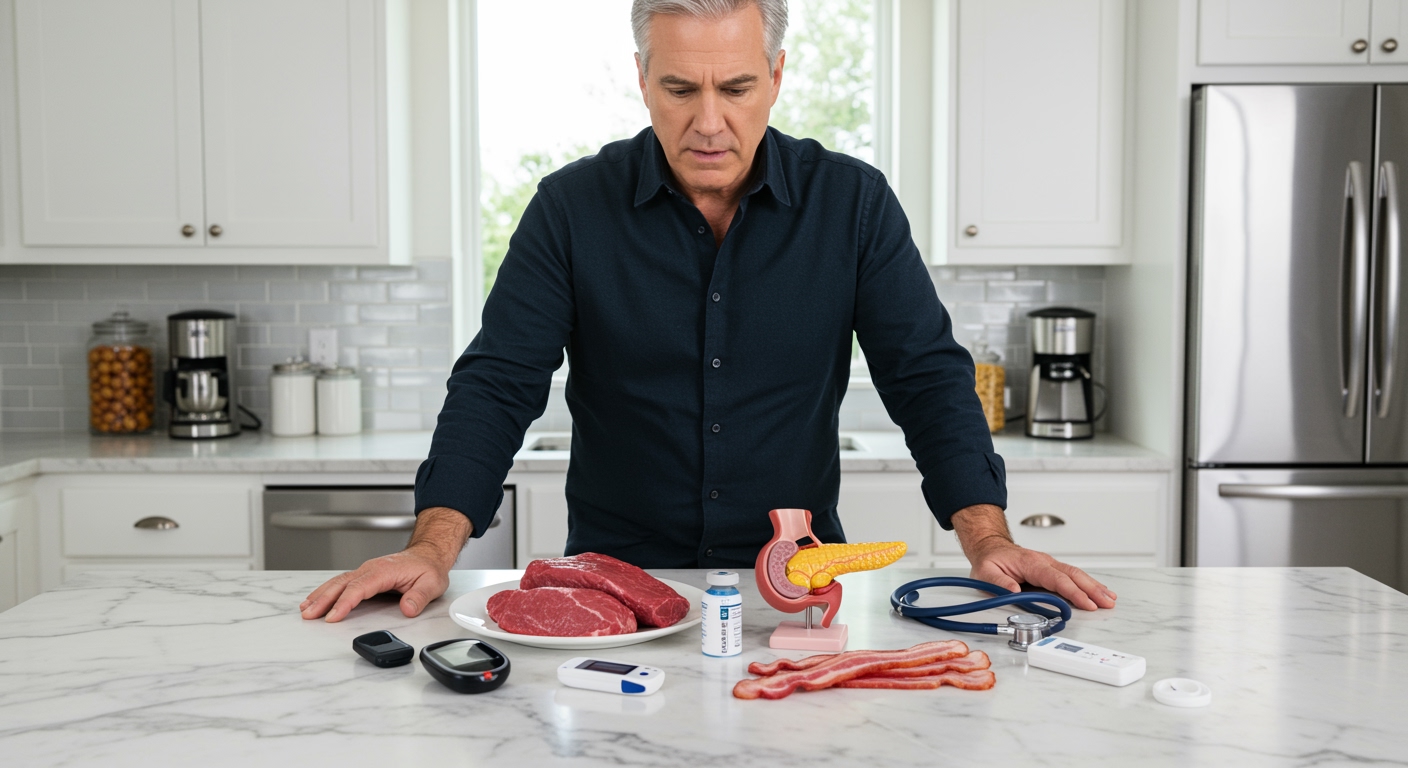✪ Key Takeaway: The carnivore diet may improve short-term blood sugar but lacks long-term safety data for diabetics.
Introduction
Your doctor just told you that your blood sugar levels are dangerously high.
You might be wondering if the carnivore diet could be your salvation from diabetes medications and constant blood sugar monitoring.
Hi, I’m Abdur, your nutrition coach and today I’m going to explain whether the carnivore diet is truly safe and effective for managing diabetes.
What Happens To Blood Sugar On Carnivore Diet?
The carnivore diet eliminates all carbohydrates from your meals.
Your body enters a state called ketosis within 2-4 days of starting this diet.
Ketosis occurs when your liver breaks down fat into molecules called ketones for energy instead of using glucose.
Many people with type 2 diabetes report dramatic improvements in their blood sugar levels within the first week.
Your pancreas produces less insulin because there are no carbohydrates to process.
This reduction in insulin demand can help your pancreatic beta cells recover from the constant stress of high blood sugar.
However, your body still needs some glucose for brain function and red blood cell production through a process called gluconeogenesis.
✪ Fact: Your liver can produce 150-200 grams of glucose daily from protein and fat even without eating carbs.
Does Science Support Carnivore Diet For Diabetes?
The research on carnivore diet specifically for diabetes is extremely limited.
Most studies focus on low-carb or ketogenic diets that still include vegetables and some plant foods.
A 2008 study showed that very low-carb diets improved hemoglobin A1c levels by 1.5% in people with type 2 diabetes.
Hemoglobin A1c measures your average blood sugar over the past 2-3 months and is the gold standard for diabetes management.
However, these studies included vegetables, nuts, and other plant foods that the carnivore diet completely eliminates.
The long-term effects of eating only animal products remain unknown because no controlled trials have followed carnivore dieters for more than a few months.
Most evidence comes from personal testimonials and small observational studies that cannot prove causation.
✪ Note: Anecdotal reports are not sufficient evidence for making major health decisions about diabetes management.
What Are The Potential Risks For Diabetics?
The carnivore diet poses several serious risks for people with diabetes.
Your kidneys work harder to process the high protein intake, which is especially concerning if you already have diabetic nephropathy.
Diabetic nephropathy is kidney damage caused by high blood sugar levels over time.
The diet eliminates all fiber sources, which can lead to severe constipation and changes in gut bacteria.
Your gut microbiome plays a crucial role in insulin sensitivity and inflammation control.
High saturated fat intake from red meat may worsen cardiovascular risk, which is already elevated in people with diabetes.
The lack of essential nutrients from plants could lead to deficiencies in vitamin C, folate, and various antioxidants that protect against diabetic complications.
✪ Pro Tip: Always consult your healthcare team before making drastic dietary changes when managing diabetes.
Who Should Avoid The Carnivore Diet?
People with type 1 diabetes should never attempt the carnivore diet without intensive medical supervision.
Type 1 diabetics require precise insulin dosing, and dramatic dietary changes can lead to dangerous blood sugar swings.
Anyone with existing kidney disease should avoid this diet completely due to the excessive protein load.
People taking diabetes medications need careful monitoring because the diet can cause blood sugar to drop too low, leading to hypoglycemia.
Hypoglycemia occurs when blood glucose falls below 70 mg/dL and can cause confusion, sweating, and even loss of consciousness.
Those with a history of eating disorders should also avoid such restrictive approaches.
Pregnant or breastfeeding women with diabetes need balanced nutrition that the carnivore diet cannot provide.
✪ Fact: Medication adjustments are essential when making major dietary changes to prevent dangerous blood sugar episodes.
What Are Better Alternatives For Diabetes?
A balanced low-carb diet offers similar blood sugar benefits without the extreme restrictions.
This approach includes lean proteins, healthy fats, and non-starchy vegetables that provide essential nutrients.
The Mediterranean diet has strong research support for improving insulin sensitivity and reducing diabetic complications.
Insulin sensitivity refers to how well your cells respond to insulin signals to take up glucose from the bloodstream.
Intermittent fasting combined with a moderate carb reduction can provide similar benefits to extreme diets.
Regular physical activity remains one of the most effective ways to improve blood sugar control naturally.
Working with a registered dietitian ensures you get a personalized plan that fits your lifestyle and medical needs.
✪ Pro Tip: Sustainable dietary changes that you can follow for years are more effective than short-term extreme approaches.
The Bottom Line
The carnivore diet may offer short-term blood sugar improvements, but the lack of long-term safety data makes it a risky choice for diabetes management.
Health is not about finding the most extreme solution, but the most sustainable one that protects your future.
I would love to hear about your experiences with different dietary approaches for diabetes management, so please share your thoughts and questions in the comments below.
References
At NutritionCrown, we use quality and credible sources to ensure our content is accurate and trustworthy. Below are the sources referenced in creating this article:
- Healthline: Carnivore Diet for Diabetes
- Harvard Health: What is the Carnivore Diet
- Harvard School of Public Health: Red Meat Consumption Associated with Increased Type 2 Diabetes Risk
- PubMed Central: Low-carbohydrate diet in type 2 diabetes





